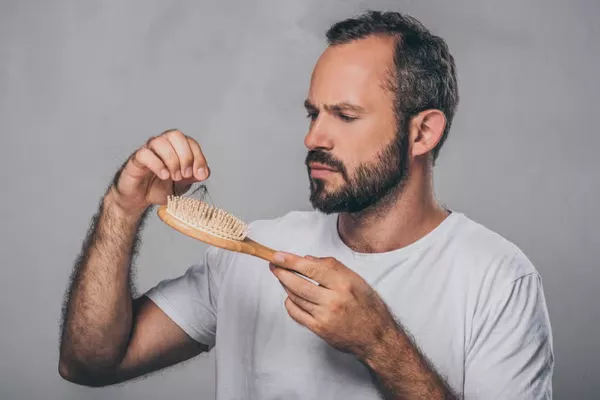Hair Loss Symptoms
Hair loss, medically known as alopecia, is a condition that affects millions of people worldwide. It can occur in both men and women and may manifest in various ways. The most common symptoms of hair loss include:
Gradual Thinning: One of the earliest signs is the gradual thinning of hair, especially on the top of the head in men and the crown area in women.
Bald Patches: Hair loss can lead to circular or patchy bald spots on the scalp, beard, or eyebrows.
Excessive Hair Shedding: Increased hair shedding during showering or brushing could be an indication of hair loss.
Receding Hairline: Men might experience a receding hairline, forming an “M” shape.
Sudden Hair Loss: Some individuals may experience rapid hair loss, which could be triggered by stress or medical conditions.
Loosening of Hair: Hair may become weaker and easily fall out even with gentle tugging.
What Causes Hair Loss?
Understanding the root causes of hair loss is crucial to finding effective treatments. Several factors contribute to this condition, including:
Genetics: The most common cause of hair loss is hereditary and known as androgenetic alopecia, or male/female pattern baldness.
Hormonal Changes: Hormonal imbalances, such as those occurring during pregnancy, childbirth, menopause, or thyroid disorders, can lead to temporary hair loss.
Medical Conditions: Certain illnesses, like alopecia areata, scalp infections, and autoimmune diseases, can cause hair loss.
Medications: Some drugs used to treat cancer, depression, arthritis, high blood pressure, and heart problems may trigger hair loss as a side effect.
Physical or Emotional Stress: Intense physical trauma, emotional stress, or major life events can lead to temporary hair loss, known as telogen effluvium.
Hairstyles and Treatments: Excessive hairstyling, such as tight braids, ponytails, or the use of harsh chemicals, can damage the hair and lead to hair loss.
How is Hair Loss Diagnosed?
If you’re experiencing hair loss, it’s essential to consult a healthcare professional or a dermatologist for a proper diagnosis. The diagnosis often involves:
Medical History: The doctor will inquire about your medical history, family history of hair loss, and any underlying health conditions.
Physical Examination: A thorough examination of your scalp and hair will help identify the type and pattern of hair loss.
Blood Tests: Blood tests may be conducted to check for any hormonal imbalances or nutritional deficiencies.
Biopsy: In some cases, a small skin biopsy may be taken from the scalp to confirm the diagnosis.
What are the Treatment Options for Hair Loss?
The treatment for hair loss depends on the underlying cause and the type of alopecia you have. Some common treatment options include:
Medications: Minoxidil and Finasteride are FDA-approved medications for treating hair loss. Minoxidil is a topical solution that can be applied to the scalp, while Finasteride is an oral medication for men.
Low-Level Laser Therapy (LLLT): LLLT devices, such as laser combs or helmets, stimulate hair growth by increasing blood flow to the hair follicles.
Prescription Medications: In some cases, doctors may prescribe medications like corticosteroids for certain types of hair loss, such as alopecia areata.
Hair Transplant Surgery: Hair transplant procedures involve removing hair follicles from one part of the body and transplanting them to areas with thinning or no hair.
Platelet-Rich Plasma (PRP) Therapy: PRP therapy involves injecting concentrated platelets from the patient’s blood into the scalp to stimulate hair growth.
Lifestyle Changes: Adopting a healthy lifestyle, including a balanced diet, regular exercise, and stress management, can promote overall well-being and potentially reduce hair loss.
How Can I Prevent Hair Loss?
While not all types of hair loss can be prevented, there are several steps you can take to promote healthy hair and potentially reduce the risk of hair loss:
Maintain a Nutritious Diet: Ensure your diet includes a variety of vitamins, minerals, and protein-rich foods to support hair health.
Avoid Overstyling: Be gentle with your hair, and avoid tight hairstyles or excessive use of heat styling tools.
Manage Stress: Practice stress-reducing techniques like meditation, yoga, or deep breathing exercises.
Avoid Smoking: Smoking can negatively impact hair health and increase the risk of hair loss.
Protect Hair from the Sun: UV rays can damage hair, so wear a hat or use a protective spray when exposed to the sun for prolonged periods.
Regular Scalp Massages: Massaging the scalp can help improve blood circulation and stimulate hair growth.
Frequently Asked Questions About Hair Loss
1. Which vitamin can help with hair loss?
Vitamin deficiencies can contribute to hair loss, so ensuring you have a well-rounded diet with adequate vitamins is essential. Vitamin D, Biotin (Vitamin B7), and Iron are particularly important for hair health.
2. What illness causes hair loss?
Several medical conditions can lead to hair loss, including thyroid disorders, alopecia areata (an autoimmune disease), and certain scalp infections.
3. How do I stop my hair from falling out?
While not all hair loss can be prevented, following a healthy lifestyle, avoiding harsh hair treatments, and managing stress can help minimize hair loss. Consult with a healthcare professional for personalized advice.
In conclusion, hair loss is a common and often distressing condition that can affect individuals of all ages and genders. Understanding the symptoms, causes, and available treatment options can empower individuals to take proactive steps to manage hair loss effectively. Remember, seeking professional advice from a dermatologist or healthcare provider is crucial for an accurate diagnosis and tailored treatment plan. By adopting a holistic approach to hair care and overall well-being, you can promote healthy hair growth and potentially mitigate the impact of hair loss.

